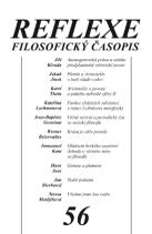Eternity and Time in Porphyry's Sentence 44
Lenka Karfíková
Just as for Plato (Tim. 37c6-39e2) and Plotinus (Enn. III,7), time is for Porphyry an image of eternity. Like in Plotinus, time is dependent on the soul; yet not on its life or being but rather on its (self-)knowledge. While Intellect always grasps all its contents in a single act, the soul contemplates its intelligible contents one by one, shifting its intention from one to the other. Time owes its existence to this interchanging actuality and latency of soul’s knowledge. It is only from the spatial movements of corporeal things that time obtains its extension and plurality.
Backlinks: Reflexe 50
